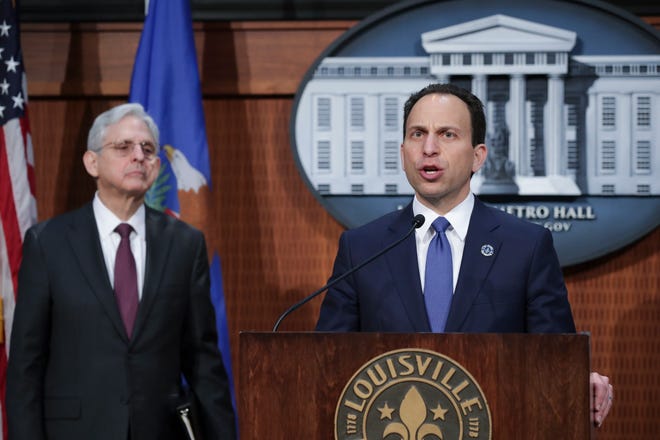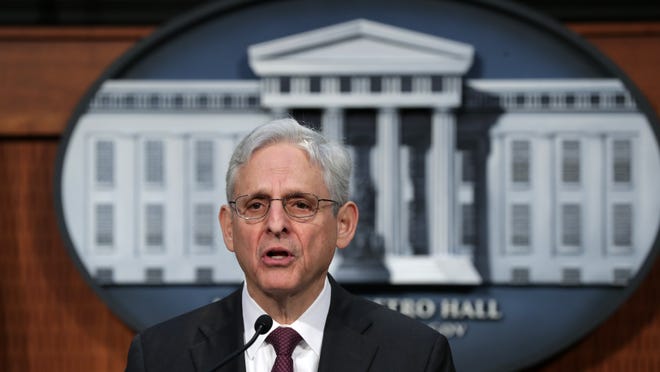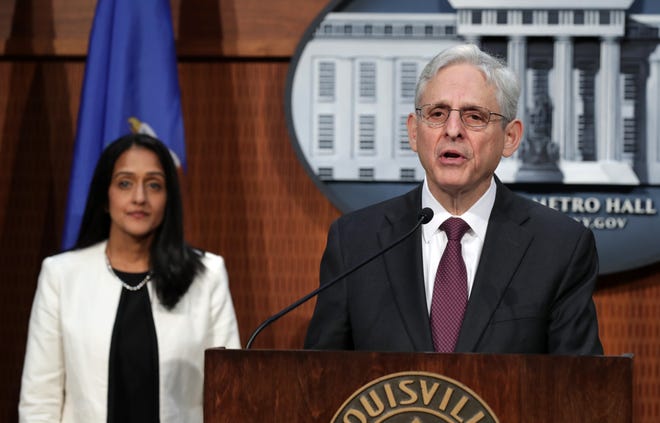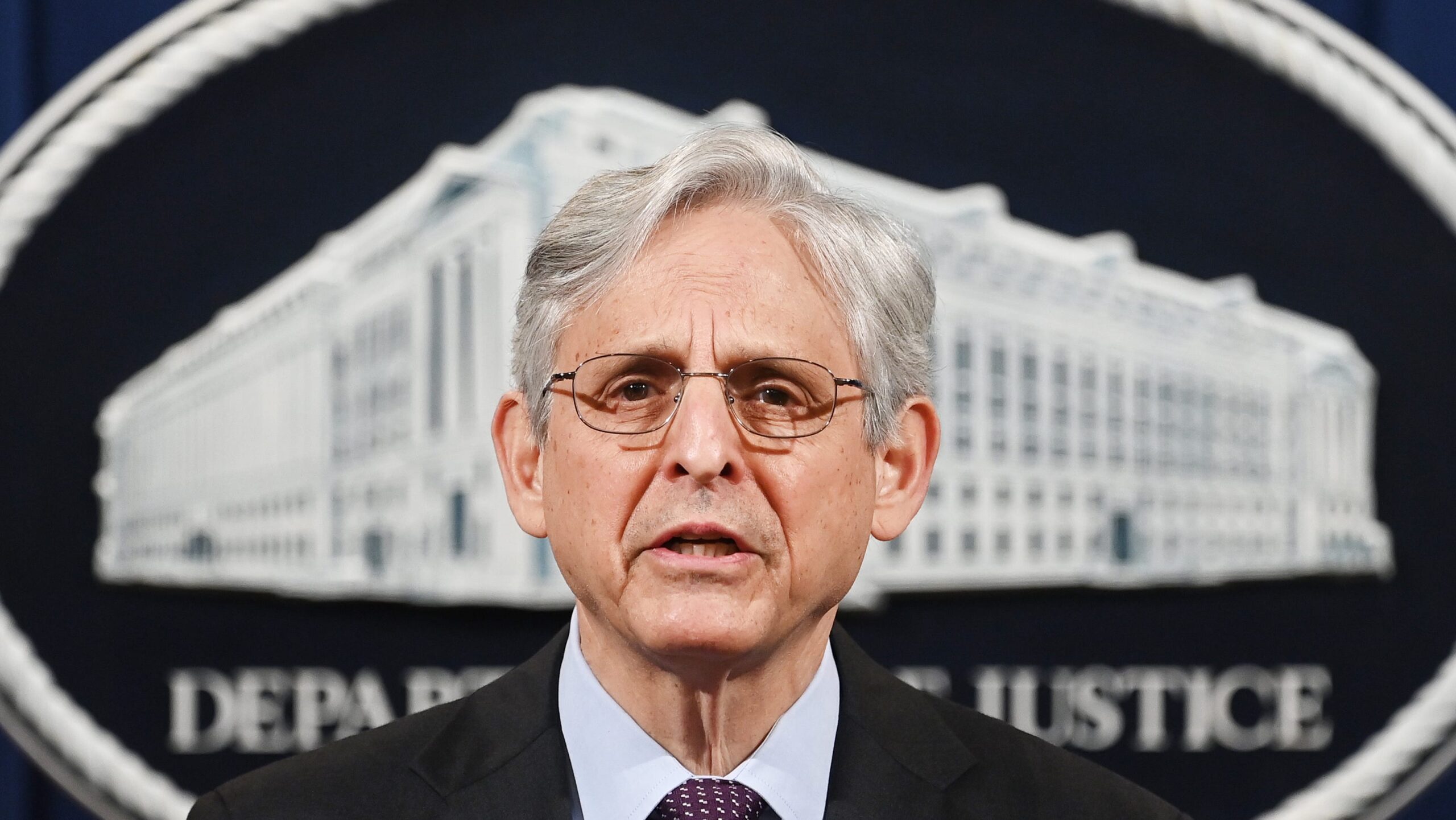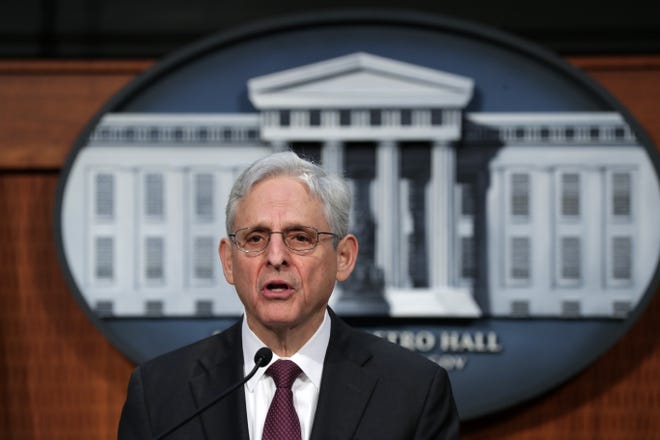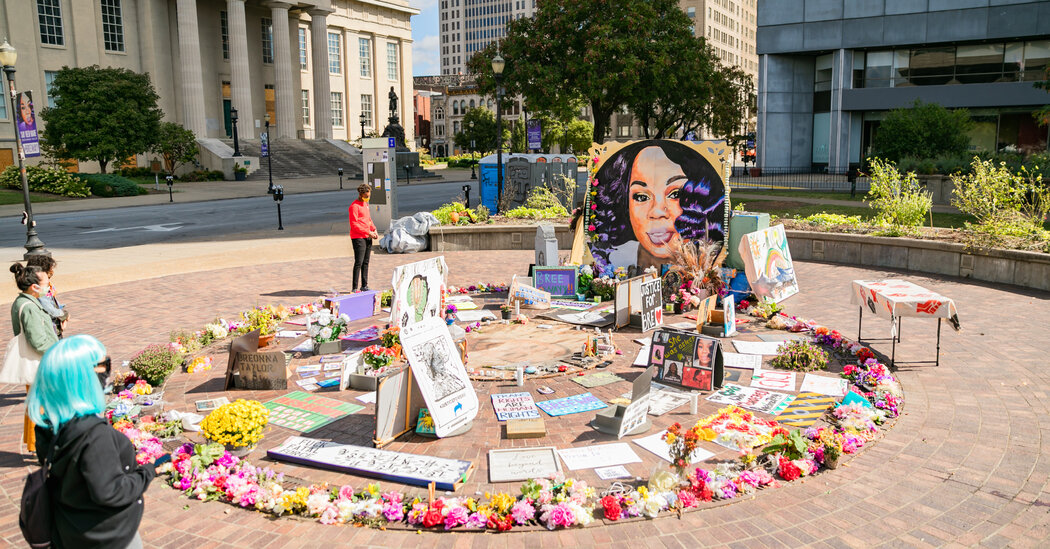U.S. Attorney General Merrick Garland spoke Wednesday alongside several officials from Louisville and the Department of Justice to reveal findings from a nearly two-year investigation into the city's government and police department.The 90-page report details issues and violations the department found in its review of Louisville Metro Police, along with recommendations for moving forward.Live updates:Findings of federal investigation into LMPD after Breonna Taylor's killingMore reactions:DOJ's report into Louisville police: How people are responding on social mediaHere are some key moments and quotes from the Wednesday press conference and from community members about the findings.Merrick Garland, US attorney general“This conduct is unacceptable. It is heartbreaking. It erodes the community trust necessary for effective policing, and it is an affront to the vas majority of officers who put their lives on the line every day to serve with honor – and it is an affront to the people of Louisville.”"To the officers of LMPD: The Justice Department is acutely aware of the integral role that law enforcement officers play in our society and the dangers you face to keep your community safe – so it is imperative that your police department sets you up for success."Vanita Gupta, associate attorney general"LMPD’s ability to serve and protect the people of Louisville has been compromised and the findings are deeply troubling and sobering. So we are committed to working with Louisville on a path forward to constitutional policing and stronger police-community trust."Kristen Clarke, assistant attorney general"These findings are not based on any one incident or event. They turn on evidence showing long-standing dysfunction at LMPD. The pattern or practice of unlawful conduct compromises LMPD’s ability to serve and protect safely, constitutionally and effectively. Instead, LMPD has practiced an extreme, misdirected and counterproductive style of policing.""Our efforts were exhaustive. We talked to hundreds of people across the city. We rode with officers in their cars on patrol. We spoke with city and union officials, judges and attorneys, advocacy groups, religious leaders and community members from different walks of life. And along with our experts, we've reviewed thousands of documents regarding LMPD’s enforcement activities, and we watch thousands of hours of body-worn camera footage."Craig Greenberg, Louisville mayor"I know some people are surprised and horrified to hear stories about certain officers operating in ways that are so counter to our values as a community. All of this is really hard to hear and hard to accept. It's infuriating. I understand that."I also know there are people who are not surprised to hear the findings in this report, because they see this report as confirmation of complaints they've made about their own interactions with law enforcement, sometimes for years. Many of those spoke out and felt dismissed or devalued. Now, the United States Department of Justice is essentially saying 'Yes, in many cases, you were right. And you deserve better.' That's a powerful thing. I understand that, too."And I know there are people who will look at this report, and they'll be eager to find some way to minimize it. or dismiss it. They'll say it's all politics, or that you could find examples like this in any city. No – this is not about politics or other places. This is about Louisville. This is about our city, our neighbors and how we serve them."Jacquelyn Gwinn-Villaroel, interim LMPD chief"This is an extremely challenging and pivotal point for our city, our department and for our officers. Now that the DOJ has concluded their investigation and presented their findings, we will continue our efforts in improving public safety in this beautiful city called Louisville and making LMPD the premier police department in the country."Tamika Palmer, mother of Breonna Taylor"What was confirmed today is that I should still be able to to pick up the phone and reach my oldest daughter Breonna. It took us having to fight day in and day out for years simply because I deserved justice for my daughter’s murder to kickstart this investigation, but today’s findings are an indicator that Breonna’s death is not vain. Our fight will protect future potential victims from LMPD’s racist tactics and behavior. The time for terrorizing the Black community with no repercussions is over."Ben Crump, civil rights attorney who represented Breonna Taylor“The family of Breonna Taylor is encouraged by the findings released today by Attorney General Merrick Garland and the Department of Justice Civil Rights Division revealing a pattern of biased policing and a long list of constitutional violations by the Louisville Metro Police Department.“These findings, and LMPD’s expected cooperation with the DOJ’s recommended remedial measures, will help protect the citizens of Louisville and shape its culture of policing. It’s steps like these, and involvement of the Attorney General and the DOJ’s Civil Rights Division, that will move our nation forward and prevent future tragedies like the one that took the life of Breonna Taylor and the countless others who have been killed unnecessarily by law enforcement.”Greg Fischer, former Louisville mayor (2011-2022)"Today is another important inflection point to honor the pain of 2020 by further acknowledging – and continuing to act on – the fact that our community deserves a new era of public safety. This era requires the leadership of the many good officers who have dedicated their lives to keep us safe and are committed to working in partnership with the community to develop a new form of constitutionally sound policing embraced by all our city’s residents."Since the summer of 2020, I have emphasized that public safety in Louisville and across America is at an inflection point. Without fundamental and widespread changes in police culture, resources, resident involvement and resulting police-community legitimacy, our city and nation will continue to needlessly endure tragedy after tragedy. National events since the summer of 2020 bear witness to this conclusion."Hannah Drake, Louisville poet and activist"The reform is only as good as the people executing them. So here’s my question that I really want to know. ... how many of those same officers are still employed at LMPD? What changes? Are those people going to magically go home and say you know what, let’s stop calling Black people monkeys and animals."Tim Findley Jr., pastor at Kingdom Fellowship Christian Life Center“Locally, what people have been saying for years has now been elevated on a national stage." “What I found most interesting was that they talked about Black people. They didn't say Black and brown. They didn't say other communities. Black people were targeted and terrorized. And that is a huge, huge reality that leadership, that the FOP must deal with, that Black people have been terrorized in Louisville for a very long time.”Sadiqa Reynolds, former CEO of the Louisville Urban League"It is what we said it was and worse. We know every officer is not corrupt but we recognize that the system is, so even the good ones do harm in their attempts to stand behind the shield in silence. The system does not allow for the humanization of Black people. There is nowhere in this city where we can be safe, not even in our homes. Policing itself is flawed but this department worked hard to go backward over the past several years. It works against Black residents, and authorizes and condones our abuse. There have been no significant consequences and no real accountability. There can never be justice without truth. And for many of us, the unrest has settled into our souls because we could not get anyone to give us the full truth. There must be some sort of racial reckoning for the Black community in Louisville. We deserve acknowledgment and accountability from the leaders in this city. I think I speak for many Louisvillians when I say, I am thankful for this thorough investigation and report. Now, I look forward to the hard work of change."Ted Shouse, Louisville attorney"Systemic racial discrimination by LMPD is recognized and proven in this report. Many of us had known this for years and today that knowledge is validated and respected. ... It is only through the recognition of these facts, that we can hope to have any path forward."Morgan McGarvey, U.S. congressman for Louisville“Excessive use of force and racial profiling in the Louisville Metro Police Department will continue to plague our community until we take decisive action to create true, lasting change. We simply cannot afford to wait."“Today’s report is a long overdue step in the right direction to hold our law enforcement accountable, but it does nothing to undo the centuries of systemic injustice Black communities have endured. We must commit to change, accountability, and justice for Breonna Taylor, George Floyd, Tyre Nichols, Tamir Rice, Michael Brown, and the far too many others who were killed by police.”

